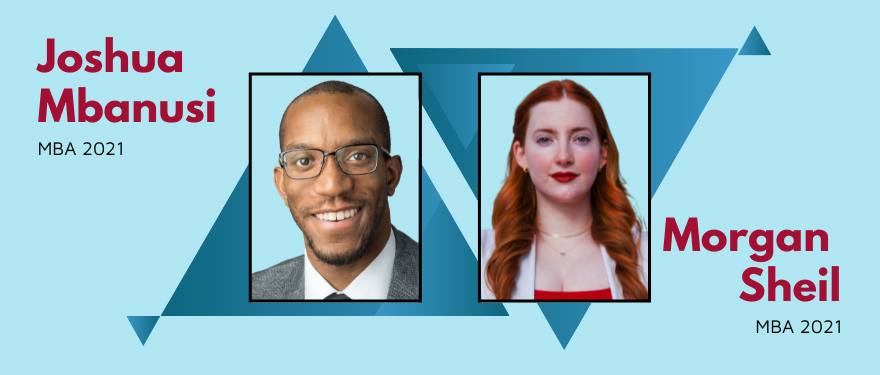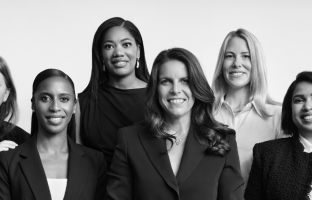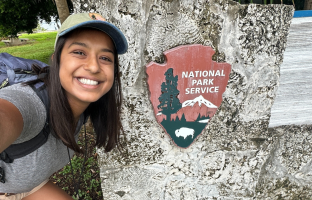Recruiters reviewing hundreds of resumes for highly coveted roles in private equity and venture capital will often see candidates with backgrounds in banking and investing. This training and experience provides candidates with excellent skills to bring to the role.
However, HBS alumni like Joshua Mbanusi (MBA 2021) and Morgan Sheil (MBA 2021), who came to business school from nonprofit and chemical engineering backgrounds respectively, prove that experience outside of investing can also be highly transferable and valuable to the field. Their stories showcase different pathways into PE/VC as well as the breadth and depth of talent at HBS.
Joshua Mbanusi’s Road to HBS
Joshua Mbanusi grew up the youngest of five children raised by a single mother and his earliest days shaped his career decisions and professional passions.
“To lift my family out of poverty, my mother worked two full time jobs while re-credentialing herself as a nurse.” After high school, Mbanusi earned his Associates degree at Collin County Community College before transferring to Cornell University where he majored in policy analysis and was exposed to poverty statistics for the first time. He was moved by them. “The United States puts forward a model for lifting families out of poverty that relies on exceptionalism,” he said. “And I believe my mother is exceptional, but that approach cannot work for everyone.”
Drawn to a career focused on economic uplift and shared prosperity, Mbanusi looked for ways to address poverty at scale which led him to focus on education and education policy as key to opening up possibilities. After two years teaching social justice in an economically distressed community with Teach for America, Mbanusi joined MDC, a nonprofit organization that focuses on public and private partnerships to equip Southern leaders, institutions, and communities to improve economic mobility and advance equity. Mbanusi found over his five years with the organization that aligning future generations of business leaders with the goal of creating prosperity that is shared and inclusive could offer a different and productive path forward.
The philanthropic consulting portfolio Mbanusi led at MDC, along with his experience founding and leading a city-wide youth organizing initiative focused on educational completion and connection to living wage work opportunities, pointed him to his next goal – earning his MBA at HBS.
Morgan Sheil’s Road to HBS
Morgan Sheil’s path to HBS began as an undergraduate chemical and biomolecular engineering student at University of Maryland. She was accepted into the 2+2 program and set out after graduation to explore potential careers and build her skills. After a year and half as a Process Engineer at Exxon Mobil in Texas, followed by a year and a half working in supply chain optimization at Pinnacle Foods in New Jersey, Sheil faced a choice – begin her MBA now or pull one more lever of change.
“I had the option to either go to HBS or I could do something else for a year, and I really wanted to make the pivot into climate,” Sheil explained. “I was worried that if I went directly to HBS it would be easier to be led astray by all the shiny opportunities that pop up here, so I went into a graduate program at the University of Cambridge in engineering for sustainable development.”
The program at the University of Cambridge presented Sheil with an opportunity to reflect and then narrow her focus on what she wanted to be doing in the climate sustainability space. With her goals defined, it was time for HBS and a pivot into systems change from a financial perspective.
Building a Bridge to PE/VC
At HBS, Mbanusi and Sheil became friends and were linked together by a shared desire to pivot their careers into investing as well as a passion for making a positive impact on the world. They both explored a range of opportunities that would allow them to alleviate poverty and mitigate climate change, and saw strategic investing as the ideal match for influencing change at scale. However, it would not be a simple career switch; they each needed to clearly identify why their non-financial backgrounds were a fit and then communicate that to funds.
The overarching theme of the bridge Mbanusi built was around strategic philanthropy, which encompassed the work he did at MDC, and his experience founding the Made in Durham Youth Network. Two of the key skill sets that Mbanusi learned to incorporate into his pitch were his ability to start and lead a new venture and his ability to network. For example, in the past Mbanusi would never have described his experience creating and building the Made in Durham Youth Network as “founding” but he made a powerful shift in his language. “Instead of ‘ran’ or ‘created,’ I learned to use phrases such as ‘founded, led, and hired my replacement’ to describe my past work, as this language resonated more with investors,” Mbanusi shared.
Sheil’s bridge was her passion for addressing climate change combined with a technical engineering and supply chain skillset. “I was only interested in climate change work, so I approached my search explaining that I may not have an investing background, but I have unique and technical knowledge in this space that you need, so I add value here and can learn new skills,” said Sheil. She advises other HBS students looking to build their bridge into investing to be targeted as well. “I think if you want to make a pivot into private equity or venture capital you need to be really thoughtful and concentrated on what you’re interested in, whether that’s consumer products, certain technologies, or climate,” she said. “And you have to see how your interests match with your background and how you add value so you have a clear narrative.”
The Power of Networking
Beyond effectively telling their stories, Mbanusi and Sheil both learned that networking would be critical to their job search and to their future success in the investing world. With that in mind, they each mapped out a list of target firms and reached out to classmates, alumni, former colleagues, professors, and PE/VC Managing Partners. Key to their strategy were two simple questions at the end of each valuable conversation – “Who else should I be talking to?” and “Would you be willing to make an introduction?”
The “spider-web” approach to networking allowed Mbanusi and Sheil to learn, refine their pitches, and build relationships in the investing sector. Ultimately, their persistence and skills landed them internships and full-time roles.
Mbanusi spent summer 2020 with DBL Partners, one of the largest impact investing funds in the country. He then joined Illumen Captial, an impact fund-of-funds that trains its fund managers to unlearn their racial and gender bias, for a winter internship and later received a full-time impact investing offer from another fund. Sheil held a summer internship with State Street and their ESG Investments & Asset Stewardship team and a six-month internship during second year of business school at Prime Coalition, a catalytic climate VC. Now she is excited to be joining KKR Capstone and KKR ESG in summer 2021 as a Climate Strategy & Resource Management Associate.
When offered a full-time role in impact investing, the partner told Mbanusi exactly how his networking had paid off. “One of the reasons they gave me the offer was because I had proven how I could network into spaces and build meaningful relationships with lots of folks within the broader impact venture ecosystem,” he said. “The Managing Partner believed my networking skills and persistence were indicative of how I would pursue building relationships with early-stage founders.”
Not every networking call was a homerun for Mbanusi though, and Sheil experienced these same challenges. Some conversations even pointedly directed her outside of the field. “On some coffee chats there were people I would talk to who would flat out tell me, ‘You are not going to find opportunities like this. This is a waste of your time. You are not a fit for that what you're trying to recruit into,’” she shared. “I had to have faith in myself and faith that the ESG space is growing rapidly and there is a unique skillset and value I can contribute.”
Seeking out Nontraditional Candidates
We at HBS look forward to seeing how Mbanusi and Sheil will continue making an impact on the world and we are also excited for other employers to see how “nontraditional” backgrounds can be an ideal fit for their PE/VC funds.
Students from a range of backgrounds will reach out to you as employers in PE/VC and we encourage you to hear their stories. It will be their job to knock on the door and then communicate their value, but employers who open that door and are willing to listen will reap the benefits. Talented candidates with diverse backgrounds add richness to the funds they join and can help your company thrive, either in person or remotely. This past year has highlighted how effective virtual work can be and remote internship and full-time options broaden the pool of potential candidates.
Your HBS Recruiting team, including Recruiting Relations Manager, Katja Frey, and Corporate Relations Director, Jonathan Shepherd, can also assist in setting a personalized recruiting strategy.
Furthermore, if you would like to connect with students who do not have a PE/VC background, but have a vested interest in the space, we encourage utilizing the HBS resume database and student clubs to find candidates who could be an ideal fit in a way you hadn’t at first considered.





.png&w=80&h=80)

